Watterson Henry

Henry Watterson (February 16, 1840 – December 22, 1921) was a United States journalist who founded the Louisville Courier-Journal. He also served part of one term in the United States House of Representatives as a Democrat. Born in Washington, D.C., the son of Harvey Magee Watterson, a journalist and Congressman, Watterson became a newspaper reporter early in his life. He fought for the Confederate States of America under General Nathan B. Forrest during the American Civil War, and edited a pro-Confederate newspaper, the Chattanooga Rebel. After the war, Watterson edited newspapers in several states before settling down in Louisville, Kentucky to edit the Louisville Journal. When that paper merged with the Louisville Courier in 1868, the Courier-Journal was formed. This paper soon gained national attention for its excellent reporting. He was a leader of the Liberal Republican movement in 1872. By 1876 he was a Democrat; his proposal for hundreds of thousands of Democrats to march on Washington to force the election of Tilden angered President Ulysses S. Grant, who noted that nobody threatened Grant. Watterson was elected to fill the rest of Edward Y. Parsons' term in the house when Parsons died in office. Watterson was called "the last of the great personal journalists", writing colorful and controversial editorials on many topics. He won the Pulitzer Prize in 1918 for two editorials supporting U.S. entry into World War I, and he remained the editor until 1919, retiring after conflicts with Robert Worth Bingham, who purchased the paper in 1918. During his tenure as editor, Watterson was a Democratic representative in Congress from 1876 to 1877, and was a five-time delegate to the National Democratic Convention, where, in 1892, he received a smattering of votes for the vice presidential nomination. He became widely known as a lecturer and orator. His publications include History of the Spanish-American War (1899) and The Compromises of Life (1902). The Interstate 264 beltway around Louisville was named after him.
do you like this author?
What readers are saying
What do you think? Write your own comment on this book!
write a commentWhat readers are saying
What do you think? Write your own comment on this author!
write a commentBook list

the compromises of life and other lectures and addresses including some observ
Series:
Unknown
Year:
Unknown
Raiting:
2.5/5
Show more
add to favoritesadd In favorites
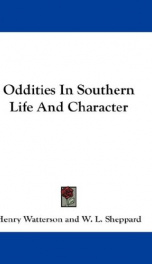
oddities in southern life and character
Series:
Unknown
Year:
Unknown
Raiting:
4/5
This scarce antiquarian book is included in our special Legacy Reprint Series. In the interest of creating a more extensive selection of rare historical book reprints, we have chosen to reproduce this title even though it may possibly have occasional imperfections such as missing and blurred pages, missing text, poor pictures, markings, dark backgrounds and other reproduction issues beyond our control. Because this work is culturally important, we have made it available as a part of our commitment to protecting, preserving and promoting the world's literature. --This text refers to the Paperback edition.
Show more
add to favoritesadd In favorites
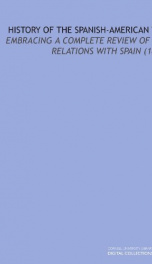
history of the spanish american war embracing a complete review of our relation
Series:
Unknown
Year:
Unknown
Raiting:
4/5
Illustrated with numerous original engravings and colored plates, accurately portraying the scenes described.
Show more
add to favoritesadd In favorites

history of the manhattan club a narrative of the activities of half a century
Series:
Unknown
Year:
Unknown
Raiting:
3/5
Show more
add to favoritesadd In favorites
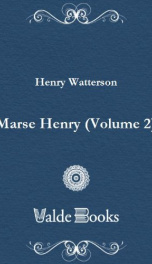
Marse Henry (Volume 2)
Series:
Unknown
Year:
Unknown
Raiting:
5/5
Marse Henry (Volume 2). please visit www.valdebooks.com for a full list of titles
Show more
add to favoritesadd In favorites
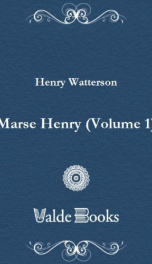
Marse Henry (Volume 1)
Series:
Unknown
Year:
Unknown
Raiting:
4.5/5
Marse Henry (Volume 1). please visit www.valdebooks.com for a full list of titles
Show more
add to favoritesadd In favorites
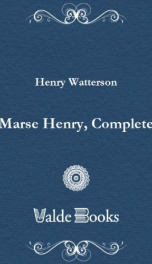
Marse Henry, Complete
Series:
Unknown
Year:
Unknown
Raiting:
3.5/5
Marse Henry, Complete. please visit www.valdebooks.com for a full list of titles
Show more
add to favoritesadd In favorites
What readers are saying
What do you think? Write your own comment on this author!
write a commentif you like Watterson Henry try:
readers also enjoyed
What readers are saying
What do you think? Write your own comment on this author!
write a commentGenre
if you like Watterson Henry try:
readers also enjoyed
Do you want to read a book that interests you? It’s EASY!
Create an account and send a request for reading to other users on the Webpage of the book!

